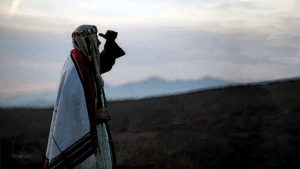 At the close of the account given in Numbers, Israel has spent 38 ½ years wandering about in the wilderness. This resulted from their unbelief in response to the majority report brought by the spies which had entered the land. That generation had died off and a new generation was prepared to enter the Promised Land. Moses was nearing the end of his ministry and gave his parting exhortation in what we know as the book of Deuteronomy.
At the close of the account given in Numbers, Israel has spent 38 ½ years wandering about in the wilderness. This resulted from their unbelief in response to the majority report brought by the spies which had entered the land. That generation had died off and a new generation was prepared to enter the Promised Land. Moses was nearing the end of his ministry and gave his parting exhortation in what we know as the book of Deuteronomy.
As Israel prepared to enter the Promised Land, God instructed Moses saying,
“Speak to the sons of Israel and say to them, When you cross over the Jordan into the land of Canaan, then you shall drive out all the inhabitants of the land from before you, and destroy all their figured stones, and destroy all their molten images and demolish all their high places;…” (Numbers 33:51-52)
And,
“But if you do not drive out the inhabitants of the land from before you, then it shall come about that those whom you let remain of them will become as pricks in your eyes and as thorns in your sides, and they shall trouble you in the land in which you live. And it shall come about that as I plan to do to them, so I will do to you.” (Numbers 33:55-56)
Of course, Israel failed in this commandment and God’s judgment fell upon them. This dominated Israel’s history for about 800 years during the First Kingdom Era (~ 1447 – 586 BC/BCE). Do you suppose that this could still be a problem in Israel?
Representatives of the tribes of Reuben and Gad (and evidently a portion of the tribe of Manasseh) sought Moses and requested to receive their inheritance on the East Bank of the Jordan River. Moses interpreted their petition as rebellion in the likeness of that of the spies that had brought an evil report earlier in the journey. It appears that Moses reluctantly agreed to their request with the provision that the armed men from these tribes cross over the river with the others and participate in the battle to conquer the land.
The conduct of these tribes demonstrates an important truth that we need to comprehend. Reuben, Gad and portions of the tribe of Manasseh saw what they wanted and went for it. They obviously were not seeing themselves in terms of God’s greater plan. They could find everything that they thought they needed on the East Bank of the Jordan but God’s plan was for all the tribes to conquer and inhabit the land between the Jordan and the western sea. This was the land that God had chosen for His redemptive purposes and was first identified as such to Abraham some 600 years earlier. (Note! Please see my new book – “Israel: God’s Interdimensional Portal” for a discussion of why this area is so important to God’s plan – available at Amazon.) Israel, at least these tribes, had little understanding of a greater plan or they simply didn’t care.
They could find everything that they thought they needed on the East Bank of the Jordan but God’s plan was for all the tribes to conquer and inhabit the land between the Jordan and the western sea. This was the land that God had chosen for His redemptive purposes and was first identified as such to Abraham some 600 years earlier. (Note! Please see my new book – “Israel: God’s Interdimensional Portal” for a discussion of why this area is so important to God’s plan – available at Amazon.) Israel, at least these tribes, had little understanding of a greater plan or they simply didn’t care.
Many believers today have done the same thing. Sometimes they are referred to as “carnal Christians”. I don’t believe this is a Biblical concept; nevertheless, I hear the expression used today. I believe that God has a specific plan for each believer who confesses that Jesus is Lord and for each local congregation that makes the same confession. Unfortunately, many are grazing their cattle on the hills of Gilead rather than living a bold, fruitful life on the mountains of Israel. They can see God’s will from a distance but are not really entering into it. This is also true of many of our Jewish brethren. The settlements of Reuben, Gad and portions of the tribe of Manasseh are in America today. Israel can be seen at a distance through Arutz Sheva or the Jerusalem Post, yet most are not fully engaged in the redemption process that is taking place in the land of Israel.
Over hundreds of years, the tribes who received their inheritance on the East Bank of the Jordan appear to have become less and less significant in terms of Biblical revelation. The main prophetic, priestly and royal lines would come through their brethren to the West specifically from the tribes of Judah and Levi. In other words, Reuben, Gad and portions of the tribe of Manasseh had an opportunity to be participants in the most important events in human history but settled for something far less significant.
Are we doing the same thing today? Are we just looking for plush pastures for our cattle or are we seeking to understand and do God’s will? A famous rabbi once said,
“My meat is to do the will of Him that sent me, and to finish his work.” (John 4:34b).